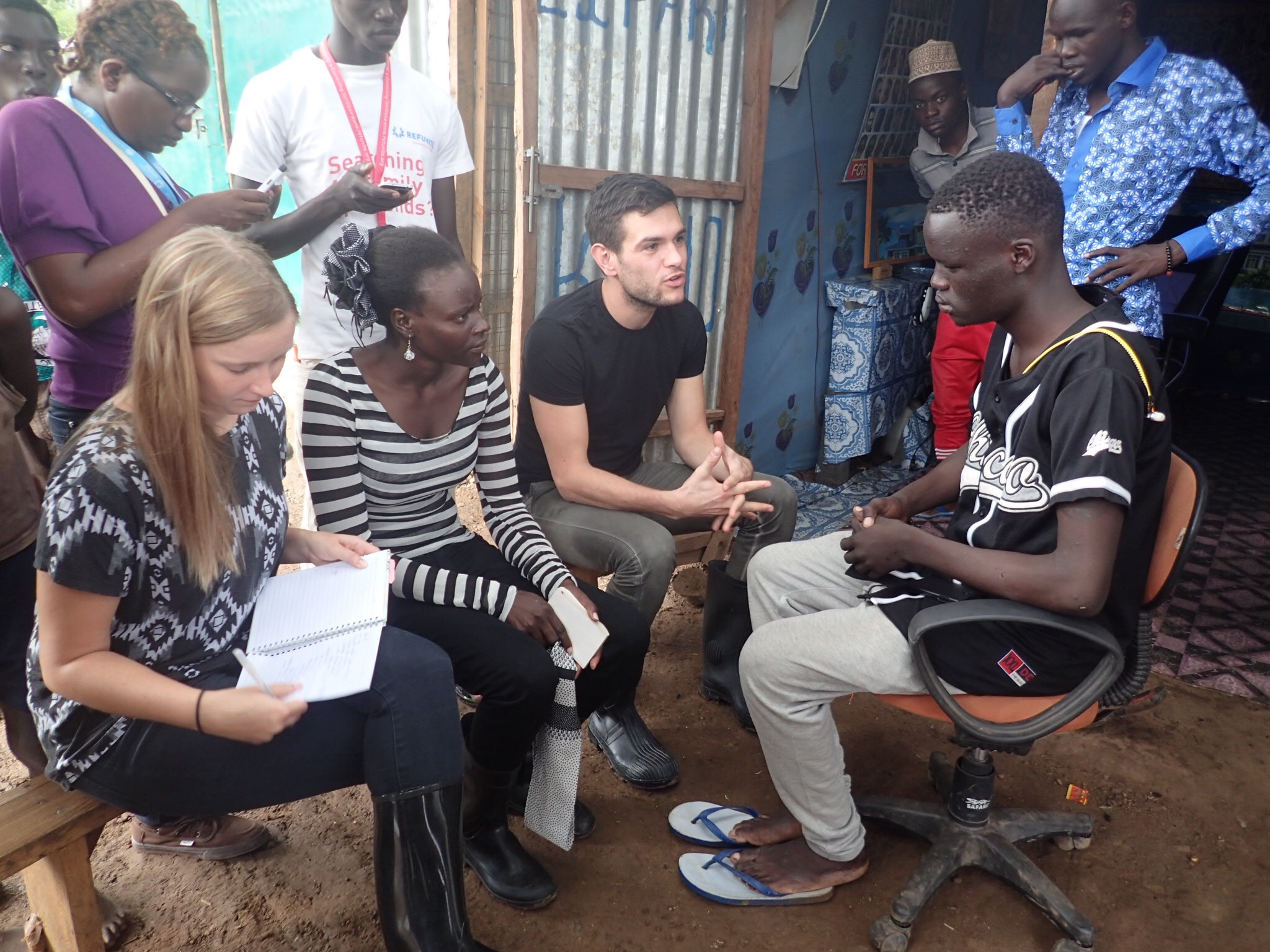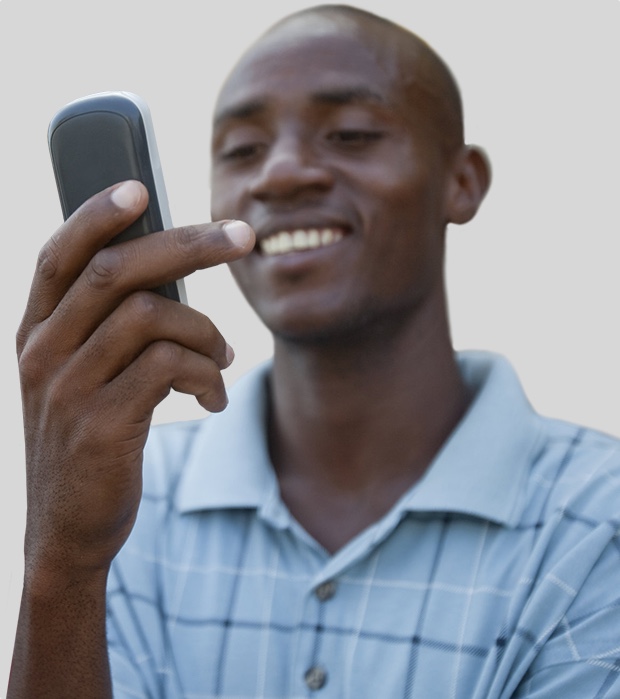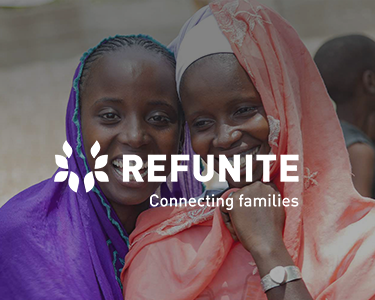
In this photo essay, Lotta Relander of REFUNITE shares photos from a recent trip to Kakuma Refugee Camp in Turkana County, Kenya.
Photo Essay: Research and Insight into Preferred Social Media Habits in Kakuma
Last December, Alexander Bugge and I, Lotta Relander, traveled to Kakuma Refugee Camp, a camp with over 180,000 refugees in Turkana County, Kenya. Alexander is a Strategic Project Manager at REFUNITE, while I take care of Communications. We wanted to perform research on the preferred social media habits of refugees at the camp, in order to see how we can further improve and build out our family reconnection platform. It was a very educational trip for both us, finding out a lot of new information about how internal communication in the camp works. We also happened to be traveling during a time when the el Nino brought heavy rains and flash floods across the camp, which came with its own challenges in conducting interviews with refugees.
Currently, REFUNITE’s family reconnection platform can be accessed via SMS and USSD in selected countries, with no Internet required. However, as we are looking into the future and the rapidly increasing smartphone penetration that can even be seen in refugee camps like Kakuma, we wanted to know if this increase in access to technology could be further leveraged on our platform. Kenya has 68% smartphone penetration, and it is only growing.
First Impressions
This was my first time visiting Kakuma Refugee Camp. Having always enjoyed working on projects in the field, I was excited to experience yet another environment to conduct research in. As much as colleagues had tried to describe what Kakuma was like, to really understand the place and its people, one has to spend time there in person.
The first afternoon, we were given a quick tour of all the different camps, which range from Kakuma 1 to 4, with Kakuma 5 being built in 2016 to accommodate the growing number of refugees, especially from South Sudan. It gave us a good understanding of how the different camps and communities were organized. One of the first things I noticed, was how much each community had managed to bring their own personal touch to their homes and their personal marketplaces.

We conducted a number of individual interviews with mostly young smartphone users between the ages of 18 and 30, from different populations of the camp, asking them about how information sharing works there. Our specific research interest lay in how the refugees communicate between each other within their Kakuma community, compared to how they reach the world outside.
We focused on the North and South Sudanese and Somali populations of Kakuma, as they were the communities we were told had the highest smartphone usage. Our first worry was that we would have trouble finding enough smartphone users, but it turned out that almost every household had at least one person with access to a smartphone.
Day 1: Kakuma 1, Hong Kong
Our first day, we visited Hong Kong, which is part of Kakuma 1. This is home to mostly North and South Sudanese refugees.
Alexander, and I, with translation help from a couple of our Outreach Volunteers, Juliana and Calvin, conducted eight interviews with Sudanese refugees living in Hong Kong. The interviews flowed very smoothly. The only problem was that we could not always interact with the refugee directly, due to language barriers. Therefore, we relied on our Outreach Volunteers to translate for us, which was very helpful. However, as with any translation, there is a risk that some crucial nuances of the answer can get lost, but our volunteers did their best to give us the real, unedited answers of the interviewees. We did our best to make it clear that we were looking for extremely honest answers, whether they were answers we were looking for or not – we just wanted the hard cold truth. We needed to truly understand the needs of the communities in Kakuma, both technology wise and otherwise in order to know how to best provide them with a useful service.

After conducting interviews all morning, we spent the afternoon going over what each of us had understood from the answers we received. It became clear very quickly that there was not much variation between different people’s preferences for information sharing and internal communication within the camp. Popular applications like Facebook and Whatsapp were overwhelmingly the applications of choice.
Day 2: Braving the Rains and Floods
The second day we continued interviews in Hong Kong. This time the weather wasn’t quite on our side, and we ended up spending a lot of the time finding shelter under which to continue our interviews. The results of the el Nino rains were evident everywhere, with roads flooded, making it hard to move around. This day, we unfortunately lost an entire afternoon of research due to the rains blocking off the only road connecting Kakuma 1 from the rest of the camps in Kakuma.


Once the rains cleared up and we were able to continue our interviews, we sat down with a number of youth in Kakuma 1 and 2 to ask them about communication in Kakuma. It became clear very quickly that smartphone penetration in Kakuma was on the rise, with more and more people, specifically youth, getting their hands on smartphones.


First, Alexander and I sat down with two of our Outreach Volunteers to ask them similar questions we asked other people in the camp, to see if they may have had a different opinion. Turned out, to a shocking degree, the majority of people we interviewed all had almost identical answers to our questions about their communication habits.
Day 3: Focus Groups
On the third day, after coming to the conclusion that mostly everyone used their phones in similar ways – mostly to communicate via Whatsapp and Facebook, not unlike the rest of youth in Kenya and globally – we wanted to see what the rest of our Outreach Volunteers themselves had to say. REFUNITE has eleven Outreach Volunteers based in Kakuma, who are all refugees themselves. They help the organization spread the word about REFUNITE around Kakuma, and help their fellow refugees sign up and start their search for family and loved ones. We also wanted to get some general feedback from our Outreach Volunteers, about what is still lacking communication wise and otherwise from Kakuma.
Once we had sat down with just a couple volunteers, we then held a larger focus group with all our Outreach Volunteers, inviting them to give us feedback on what we had learned and our ideas that came from this.

We received feedback regarding topics that people in Kakuma usually discuss on social media and WhatsApp. The range was vast, from people discussing sports and setting up pick-up games, all the way to serious discussions about politics and peace.
Generally, we were pleasantly surprised by the vast penetration of smartphones and mobile phone usage in general at Kakuma. At least in the South Sudanese and Somali communities, it was estimated that most households have at least one member with a smartphone. While owning a smartphone gives you new opportunities such as using data wherever you are, and new applications not available on feature phones, it also comes at a higher usage cost due to data costs and shortened battery life. But even with these concerns, it still seemed like smartphones were a hot commodity, and anyone with the resources found a way to get one. Finding someone without access to a smartphone is becoming less and less frequent. This gave us plenty of information to go back to the rest of the REFUNITE team and focus on improving our ability to connect disconnected families.




